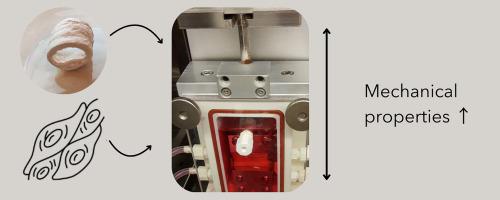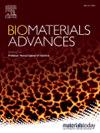Functional outcome of cell seeded tracheal scaffold after mechanical stress in vitro
IF 5.5
2区 医学
Q2 MATERIALS SCIENCE, BIOMATERIALS
Materials Science & Engineering C-Materials for Biological Applications
Pub Date : 2024-10-31
DOI:10.1016/j.bioadv.2024.214088
引用次数: 0
Abstract
Tracheal tissue engineering is still facing major challenges: realization of efficient vascularization and mechanical properties comparable to native trachea need to be achieved. In this study, we present a strategy for the manufacturing of a construct for tracheal tissue engineering by conditioning through cell seeding followed by mechanical stimulation in vitro. Scaffolds derived from porcine trachea decellularized with supercritical carbon dioxide were seeded with stem cells of different tissue sources and cultured in a bioreactor for 21 days under mechanical stimulation. Enhanced chondrogenic development was demonstrated, with improved sulphated glycosaminoglycan secretion and cellular alignment which resulted in mechanical properties resembling native trachea. This method may provide a useful addition to tracheal tissue engineering strategies aimed at optimizing cartilage formation.

细胞播种气管支架在体外机械应力作用下的功能结果。
气管组织工程仍面临重大挑战:需要实现高效的血管化和与原生气管相当的机械性能。在本研究中,我们提出了一种气管组织工程构建物的制造策略,即通过细胞播种进行调节,然后在体外进行机械刺激。用超临界二氧化碳对猪气管进行脱细胞处理后得到的支架接种了不同组织来源的干细胞,并在机械刺激下在生物反应器中培养了21天。结果表明,软骨发育得到加强,硫酸化糖胺聚糖的分泌和细胞排列得到改善,从而使机械性能与原生气管相似。这种方法可为旨在优化软骨形成的气管组织工程策略提供有益的补充。
本文章由计算机程序翻译,如有差异,请以英文原文为准。
求助全文
约1分钟内获得全文
求助全文
来源期刊
CiteScore
17.80
自引率
0.00%
发文量
501
审稿时长
27 days
期刊介绍:
Biomaterials Advances, previously known as Materials Science and Engineering: C-Materials for Biological Applications (P-ISSN: 0928-4931, E-ISSN: 1873-0191). Includes topics at the interface of the biomedical sciences and materials engineering. These topics include:
• Bioinspired and biomimetic materials for medical applications
• Materials of biological origin for medical applications
• Materials for "active" medical applications
• Self-assembling and self-healing materials for medical applications
• "Smart" (i.e., stimulus-response) materials for medical applications
• Ceramic, metallic, polymeric, and composite materials for medical applications
• Materials for in vivo sensing
• Materials for in vivo imaging
• Materials for delivery of pharmacologic agents and vaccines
• Novel approaches for characterizing and modeling materials for medical applications
Manuscripts on biological topics without a materials science component, or manuscripts on materials science without biological applications, will not be considered for publication in Materials Science and Engineering C. New submissions are first assessed for language, scope and originality (plagiarism check) and can be desk rejected before review if they need English language improvements, are out of scope or present excessive duplication with published sources.
Biomaterials Advances sits within Elsevier''s biomaterials science portfolio alongside Biomaterials, Materials Today Bio and Biomaterials and Biosystems. As part of the broader Materials Today family, Biomaterials Advances offers authors rigorous peer review, rapid decisions, and high visibility. We look forward to receiving your submissions!

 求助内容:
求助内容: 应助结果提醒方式:
应助结果提醒方式:


